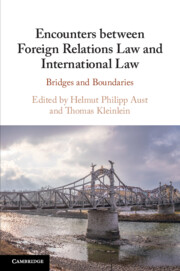Academic discourses on closely related issues sometimes develop in parallel, without much interaction between either track. To some extent, this is the case in the parallel universes of foreign relations law and public international law. Both fields can only exist with due acknowledgment of the other, but at times it appears as if differences and divergences between the two are overstated for the sake of solidifying one’s own perspective. This present volume departs from the assumption that we need bridges as well as boundaries between foreign relations law and public international law: bridges in order to better understand the mutual dependency of the two fields, boundaries so as not to collapse one field into the other. As editors, we think that the encounters between the two fields assembled in the following pages are of a productive nature. They will hopefully contribute to a further flourishing engagement with the bridges and boundaries between foreign relations law and public international law.
Putting together this volume was made possible first and foremost by the enthusiasm with which our authors joined us on this journey, which started at the Old Castle in Dornburg close to Jena in May 2019 with an informal research workshop. Back then the first ideas for this volume developed. Our group of authors made our task as editors easy and we are grateful for various and mutual learning processes in which we engaged in the run-up to this book.
At Cambridge University Press we would like to thank Finola O’Sullivan and Marianne Nield who have steered the volume expertly to production. We are grateful to four anonymous reviewers for valuable insights which have helped to further improve the conceptual structure of the volume.
The production of this book was made possible with the financial support of various institutions. The 2019 authors’ workshop was supported by the Friedrich Schiller University Jena (FSU Jena) and Freie Universität Berlin (FU Berlin). The open access publication of this volume is enabled by support from the University Library of FU Berlin, the Faculty of Law of the FSU Jena and the Department of Law of FU Berlin.
Finally, we would like to thank our teams in Berlin and Jena for the dedicated support in preparing the manuscript for publication. Susanne Prater and Felix Schott were heavily involved in the project from the very beginning and we would like to thank them warmly for their active support. We would also like to thank Denys Forshayt, Annika Franz, Alexandra Konecny, Gundula Maxwill, Kerstin Oelstrom, Alexander Silke and Annemarie Wagner for their commitment.

